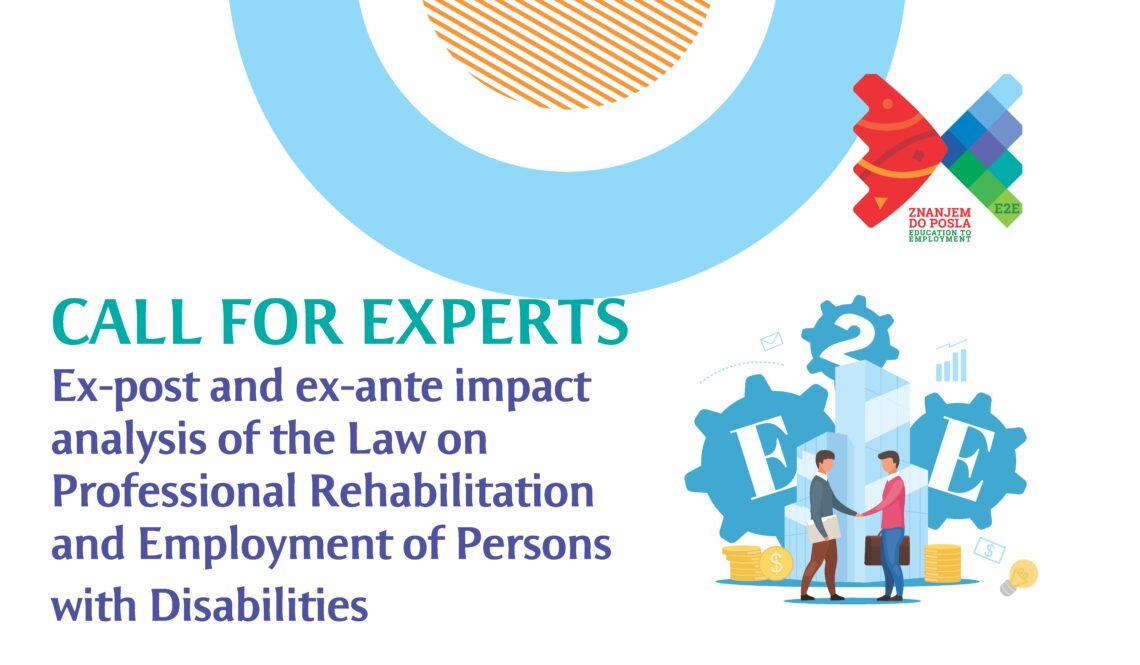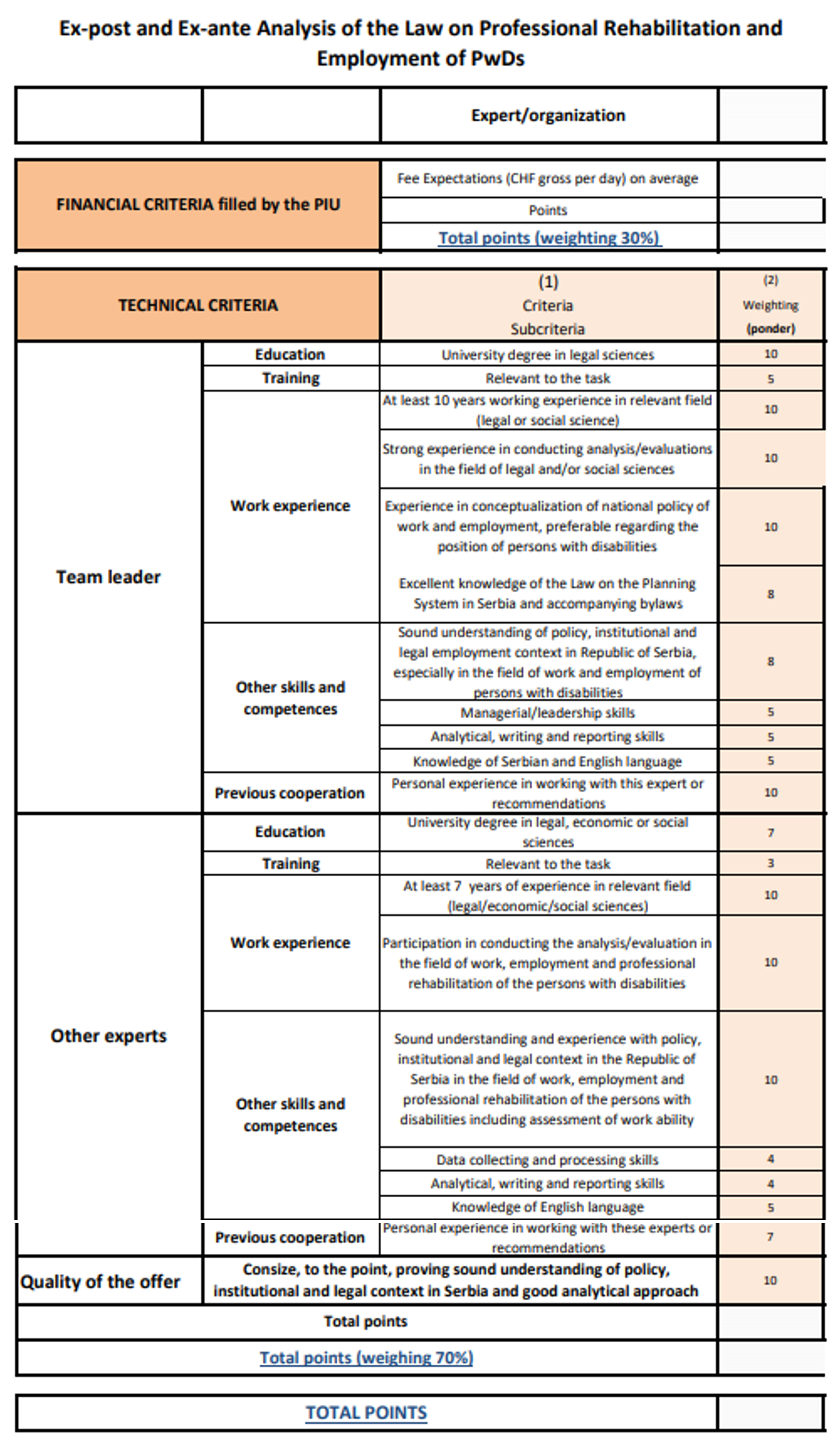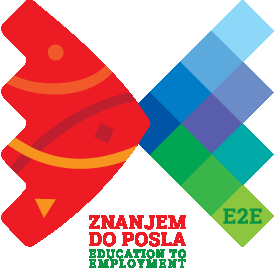Call for experts: Ex-post and ex-ante impact analysis of the Law on Professional Rehabilitation and Employment of Persons with Disabilities
08.06.2023

1. Background and context
The Swiss Agency for Development Cooperation (SDC) assigned NIRAS - IP Consult to implement the project “From Education to Employment” in Serbia (hereinafter: E2E) – Phase 2 starting in January 2020 till the end of 2023.
The E2E supports evidence-based approaches in the youth employment policies in Serbia. Since Jan 2022, NIRAS-IP Consult implements the program at both the national and local level.
At the national level, the key line ministry in charge of the implementation of the youth employment and employability policies in Serbia relevant for the implementation of the E2E is the Ministry of Labor, Employment, Veteran and Social Affairs (hereinafter: MoLEVSA) with the support of the Ministry of Education (hereinafter: MoE). Line ministries have been actively involved in the design and implementation since the E2E Project started.
The overall goal of the E2E is to increase decent youth employment in Serbia in a socially inclusive and sustainable way. The project has two outcomes:
1. Relevant national and local key stakeholders apply effective and evidence-based policies on youth employment and employability through increased performance capacities and diversified funding portfolio.
2. Young job seekers are better able to position themselves on the labour market through employment promotion measures and non-formal training offers required by the private sector in selected regions of Serbia.
As per Outcome 1 the following key Outputs are envisaged:
1.1. Legal and policy framework for youth employment and training is more effective and responsive to the needs of the private sector.
1.2. Improved quality of existing and new public services to promote employment and employability.
1.3. Established competence of local labor market players to ensure funding and provide better services for young people - building up local networks and alliances.
This specific Terms of Reference is related to the achievement of Outcome 1, Output 1.1. as to support the MoLEVSA as an institutional focal point for the E2E, in improving the legislative framework in the field of employment of persons with disabilities. This activity is envisaged in the Memorandum of Understanding between the SDC and MoLEVSA signed on April 13th, 2022 stipulating a detailed list of policy activities that will be supported through E2E/NIRAS-IP.
As the key process the Law on Professional Rehabilitation and Employment of Persons with Disabilities (Official Gazette of the RS, no 36/09, 32/13 and 14/22 – other law)
regulates the rights and obligations of persons with disabilities (hereinafter: PwDs), assessment of work capacity, promotion of the employment of PwDs, professional rehabilitation, employment of PwD, active employment policy measures for PwDs and special forms of employment and work engagement of PwDs such as enterprises for professional rehabilitation and employment of PwDs and job centres.
Based on the Law, the following relevant bylaws were adopted:
- Rulebook on the detailed manner, costs and criteria for assessing the work capacity and ability to employ or maintain employment of persons with disabilities (Official Gazette of the RS, no 36/2010 and 97/2013);
- Rulebook on closer conditions, criteria and standards for the implementation of measures and activities of professional rehabilitation (Official Gazette of the RS, no 112/2009) and
- Rulebook on the manner of monitoring the fulfillment of the obligation to employ persons with disabilities and the manner of proving the fulfillment of that obligation (Official Gazette of the RS, no 101/2016).
The Law on Professional Rehabilitation and Employment of Persons with Disabilities (hereinafter: the Law on PwDs) was adopted in 2009 and amended in 2013. Amendments to the Law from 2013 were aimed at harmonizing with official statistics, thus monitoring salary movements on a monthly basis, as well as establishing a balance between different forms of fulfilling the employment obligation in favor of establishing an employment relationship with PwD. These changes also ensured the harmonization of the provisions of the Law with the established regulations on state aid, which prescribe state aid schemes for the employment of PwDs. In 2022, with the entry into force of the Law on Social Entrepreneurship (Official Gazette of the RS, no 14/22), all provisions related to social enterprise and organization in the Law ceased to be valid.
As the mentioned amendments to the Law on PwDs were not of a large scale, it needs to be reconsidered whether the 13-year-old law is still adequate enough to fulfill its basic purpose which is to improve the position of the PwDs on the labor market, especially considering the fact that in the last few years two policy strategies have been adopted in the area regulated by the Law, the Strategy for Improving the Position of Persons with Disabilities in the Republic of Serbia for the period from 2020 to 2024 (Official Gazette RS, No 44/20) and the Employment Strategy of the Republic of Serbia 2021-2026 (Official Gazette RS, No 18/21 and 36/21 – correction).
In 2018 the Law on the Planning System of the Republic of Serbia (Official Gazette RS, No 30/18; hereinafter: the Law on the Planning System) which regulates the planning system of the Republic of Serbia, as well as the management of the system of public policies and the type and contents of the planning documents was adopted. According to the Law on the Planning System, public policy documents are produced in accordance with the results of an ex-post and ex-ante impact analysis. In the previous period the E2E has supported the MoLEVSA to align the employment policy documents with the Law on the Planning System as follows: in 2018 the proposal for amendments to the Law on Employment and Unemployment Insurance has been formulated in order to align the process of adoption of the employment policy documents with the Law on the Planning System; in 2019 the ex-post impact analysis of the National Employment Action Plan (hereinafter: NEAP) for 2017 and of the NEAP for 2018, and the ex-ante impact analysis for the NEAP for 2020 were prepared; in 2020 the ex-post impact analysis of the National Employment Strategy for the period 2011-2020 and ex-ante impact analysis of the new Еmployment Strategy for the period 2021-2026 were prepared. Currently, the preparation of the ex-post and ex-ante impact analysis of the Law on Employment and Unemployment Insurance is ongoing, with the support of the E2E.
2. Objective of the assignment
The objective of the assignment is to conduct an ex-post and ex-ante impact analysis of the Law on Professional Rehabilitation and Employment of Persons with Disabilities and all bylaws, in line with the Law on the Planning System and Regulation on the methodology of public policy management, impact analysis of public policies and regulations, and the content of individual public policy documents (Official Gazette of the RS, no 8/19; hereinafter: the Regulation) and to participate and advice in consultation process at round tables with stakeholders that MoLEVSA will invite.
The tasks of the Expert(s) or Team shall be:
1. To develop the methodology and work plan for conducting the ex-post and ex-ante impact analysis of the Law on Professional Rehabilitation and Employment of Persons with Disabilities and all bylaws (in close consultation with MoLEVSA and E2E PIU);
2. To conduct the ex-post and ex-ante impact analysis of the Law on Professional Rehabilitation and Employment of Persons with Disabilities and all bylaws;
3. To actively participate and provide advice in consultation process at round tables with stakeholders invited by MoLEVSA.
In the part of the ex-post impact analysis, the implementation of the Law on Professional Rehabilitation and Employment of Persons with Disabilities, adopted in 2009, including amendments to the Law and adopted bylaws, should be considered, with the aim of evaluating the achieved effects, to determine compliance with new public policies and providing recommendations for further improvement of legislation in the field of professional rehabilitation and employment of PwDs.
In the part of the ex-ante impact analysis, the following main aspects should be included:
- Analysis of the existing situation:
- analysis of the achieved results in the implementation of the Law on Professional Rehabilitation and Employment of Persons with Disabilities including the results of the ex-post analysis;
- identification of planning documents and especially public policy documents, as well as regulations, which have a direct impact on the situation in the area to which the Law on PwDs applies and analysis of that impact, with the aim of consistent and coordinated action in that area;
- identification of problems, their scope, importance and causes, and the consequences they cause in practice, as well as determining the key problem that needs to be solved, that is, the identification of the change to be achieved;
- analysis of the option of not taking additional measures to change the existing situation (status quo option), by projecting the existing situation in the future in order to assess whether it is possible to achieve change without additional intervention.
Listed main aspects within the preparation of the ex-ante impact analysis are described in the Regulation. Providing answers to the questions in appendix 2–10 of the Regulation can also be helpful in making the analysis, although the questions need not be limited to those listed in the appendices.
Further, the ex-ante impact analysis should include:
- a review of legal solutions that regulate professional rehabilitation and employment of PwD in Republic of Slovenia and some other countries (Montenegro, some of EU countries), focusing on new trends and challenges, institutional and financial framework, actors recognized in the process of the implementation of the legal solutions, etc, in order to suggest suitable solutions for Serbia;
- recommendations for improvement of the Law on PwDs;
- final identification of resources, that is, the assessment of financial effects on the budget of Republic of Serbia for the selected option (amendment, addition or drafting of a new Law on PwDs).
The mandate shall be performed in close cooperation and consultation with MoLEVSA and E2E PIU staff.
3. The Expert’s (or Team) profile
The proposed key staff shall have the following skills, experience and qualifications:
1. Team Leader
- University degree in legal sciences
- At least 10 years working experience in relevant field (legal or social sciences)
- Strong experience in conducting analysis/evaluations in the field of legal and/or social sciences
- Sound understanding of policy, institutional and legal employment context in Republic of Serbia, especially in the field of work and employment of persons with disabilities
- Experience in conceptualization of national policy of work and employment, preferable regarding the position of persons with disabilities
- Excellent knowledge of the Law on the Planning System in Serbia and accompanying bylaws
- Experience in cooperation with national and international stakeholders (civil society, public administration, social partners, etc.)
- Excellent knowledge of the Serbian and the English language
- Excellent managerial/leadership skills
- Excellent analytical, writing and reporting skills
- Excellent communication skills
2. Key Expert 1
- University degree in legal, economic or social sciences
- At least 7 years of experience in relevant field (legal/economic/social sciences)
- Sound understanding and experience with policy, institutional and legal context in the Republic of Serbia in the field of work, employment and professional rehabilitation of the persons with disabilities including assessment of work ability
- Participation in conducting the analysis/evaluation in the field of work, employment and professional rehabilitation of the persons with disabilities
- Knowledge of the English language
- Excellent data collecting and processing skills
- Excellent analytical, writing and reporting skills
3. Key Expert 2
- University degree in legal, economic or social sciences
- At least 7 years of experience in relevant field (legal/economic/social sciences)
- Sound understanding and experience with policy, institutional and legal context in the Republic of Serbia in the field of work, employment and professional rehabilitation of the persons with disabilities including assessment of work ability
- Participation in conducting the analysis/evaluation in the field of work, employment and professional rehabilitation of the persons with disabilities
- Knowledge of the English language
- Excellent data-collecting and processing skills
- Excellent analytical, writing and reporting skills
The engaged expert team should consist of max. 2-3 experts. It is possible also to apply as a single service provider or expert. NIRAS-IP and partners will then assess the CVs and experts and form an expert team of max 2-3 persons.
4. Deliverables
The deliverables of the assignment shall comprise:
For the Task 1:
- Draft methodology and work plan for the development of the ex-post and ex-ante impact analysis of the Law on Professional Rehabilitation and Employment of Persons with Disabilities and all bylaws including the list of stakeholders/actors to be consulted;
- Implemented consultation process with MoLEVSA and E2E PIU to collect and integrate different feedbacks regarding the proposed methodology and work plan;
- Final methodology and work plan.
For the Task 2:
- First draft of the ex-post/ex-ante impact analysis of the Law on Professional Rehabilitation and Employment of Persons with Disabilities (the outline of the report should be agreed with MoLEVSA and the E2E PIU before writing the report);
- Implemented consultation process with MoLEVSA and E2E PIU to collect and integrate feedback regarding the proposed first draft of the ex-post/ex-ante analysis;
- Second draft of the ex-post/ex-ante impact analysis of the Law on Professional Rehabilitation and Employment of Persons with Disabilities;
- Implemented consultation process with MoLEVSA, E2E PIU and round tables participants to collect and integrate feedback regarding the proposed second draft ex-post/ex-ante impact analysis;
- Final ex-post/ex-ante impact analysis of the of the Law on Professional Rehabilitation and Employment of Persons with Disabilities.
For the Task 3:
- Presentation of the second draft of the ex-post/ex-ante impact analysis of the Law on Professional Rehabilitation and Employment of Persons with Disabilities at the round table with stakeholders invited by the MoLEVSA;
- Presentation of the final ex-post/ex-ante impact analysis of the Law on Professional Rehabilitation and Employment of Persons with Disabilities at the round table with stakeholders invited by the MoLEVSA.
Regarding Task 2, ex-post and ex-ante impact analysis should be done as two documents, first ex-post and then ex-ante.
Regarding Task 3, presentations at the round tables can be combined, depending on the dynamics agreed with the MoLEVSA and E2E PIU.
All the deliverables, for all three tasks, should be agreed within the expert`s team and presented in the Serbian language.
5. Timeline, Venue, and Reporting
For the deliverables defined in Article 4 are expected to be realized in the period 3rd July – 31st December, 2023. All tasks will be carried out in Belgrade with the possibility of holding round tables outside Belgrade, whereby the expenses of the experts (travel costs, hotel) will be paid by the E2E PIU.
The expert submits technical reports to the Deputy Head of Project – Milena Janković.
6. Contracting
The service contract which is to be signed by two parties shall cover the period between 3rd July and 31st December 2023.
7. Dynamics of payment
First installment – against man-days and deliverables after completing the Task 1;
Second installment – against man-days and deliverables after completing the Task 2;
Third installment – against man-days and deliverables after completing the Task 3.
8. Application procedure
Deadline for Application: 23rd June 2023
Individual consultants and organizations can apply for this assignment.
Applicants are requested to submit the following:
- Technical offer - suggested methodology and timeline for implementing the 3 tasks;
- Information on the experience of the expert or organization in the implementation of similar activities (at least 2 reference projects);
- CVs of the Team leader and key experts;
- Financial offer based on man-days per task in CHF covering the anticipation and division of working days per each three tasks and expert teams.
Submission of Applications should be done to the email address: E2E@Niras.com and Milena Janković milena.jankovic@ip-consult.de no later than 23rd June 2023.
Only shortlisted candidates will be contacted by 3rd July 2023.
9. Evaluation grid



